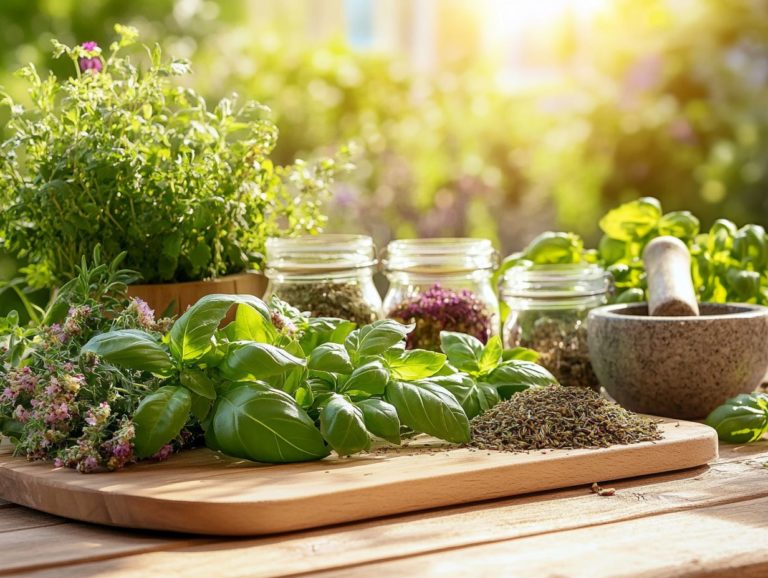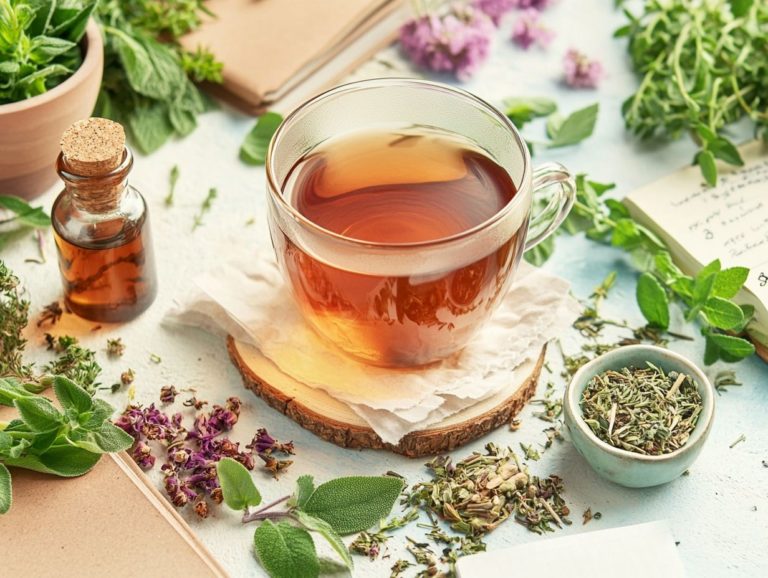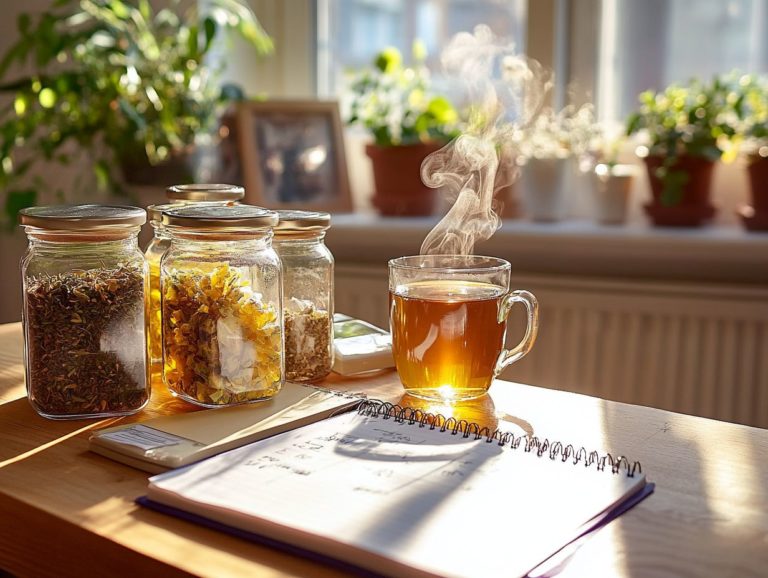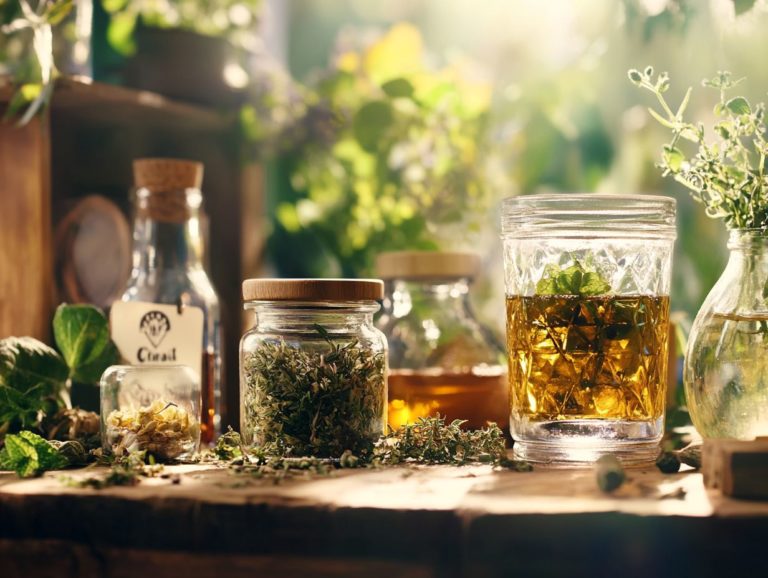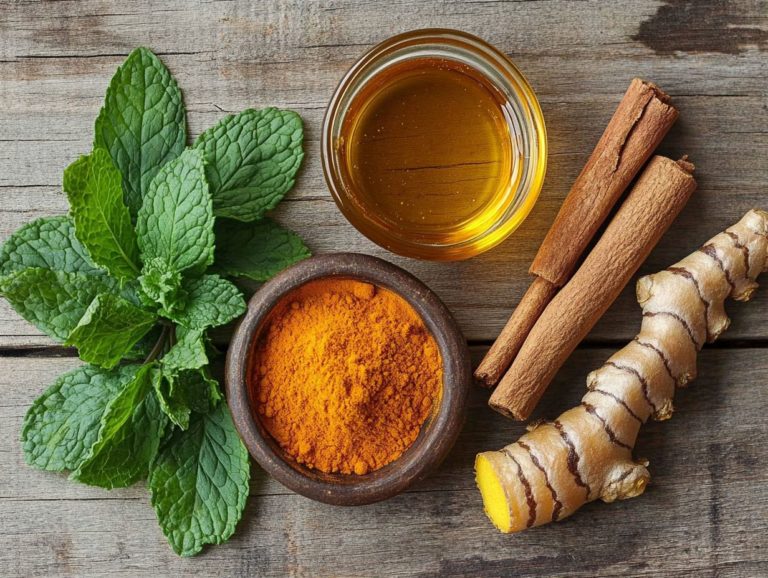How Do I Know if an Herb is Safe?
Herbal remedies have surged in popularity due to their potential health benefits. However, figuring out the safety of these natural products can be quite a conundrum.
This article dives into what determines whether an herb is safe or unsafe. It guides you through the essential factors you need to consider in your herbal safety assessments.
With access to reliable sources for research and insights into how your individual health and medication interactions can affect safety, you’ll develop a thorough understanding of commonly used herbs and their profiles.
You will also discover practical tips for safe consumption and dosage, empowering you to enjoy the benefits of herbs with confidence and responsibility.
Contents
- Key Takeaways:
- Getting to Know Herbal Safety: What You Need to Know!
- Researching the Safety of an Herb
- Factors to Consider When Assessing Safety
- Commonly Used Herbs and Their Safety Profiles
- Practicing Safe Use of Herbs
- Frequently Asked Questions
- How Do I Know if an Herb is Safe?
- What are some potential risks associated with using herbs?
- Are there any specific safety guidelines for using herbs?
- How can I ensure the quality and safety of the herbs I am using?
- Are there any warning signs that an herb may not be safe for me?
- Can certain groups of people safely use herbs?
Key Takeaways:
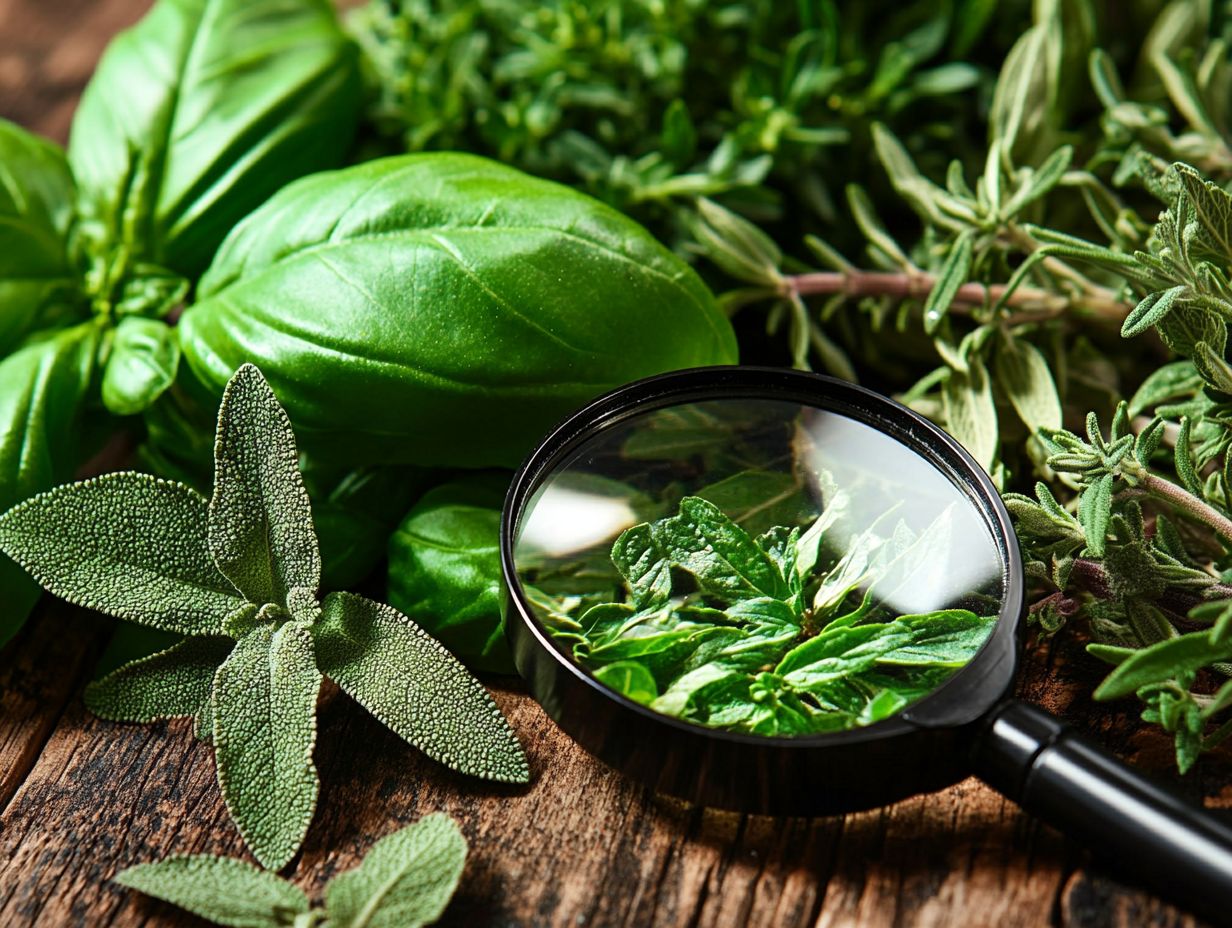
- Always research an herb’s safety before using it.
- Consider your health and any possible medication interactions.
- Practice safe consumption and follow proper dosages.
Getting to Know Herbal Safety: What You Need to Know!
Understanding herbal safety is essential for anyone thinking about using herbal supplements or remedies to manage health conditions. In recent years, you may have noticed a significant rise in the popularity of herbal medicine. Yet safety concerns continue to loom regarding the potential risks linked to these natural products.
While it’s tempting to seek health benefits through herbal treatments, it’s important to acknowledge the absence of FDA regulations, which ensure products are safe and effective. This lack of oversight can result in inconsistent standards and purity issues. Therefore, staying informed about the scientific evidence surrounding these supplements and consulting with a healthcare provider is imperative for making safe and effective choices, including knowing how to create a safe herbal dosage plan.
What Makes an Herb Safe or Unsafe?
Determining whether an herb is safe or unsafe requires careful evaluation of various factors, including its herbal ingredients, traditional uses, and documented negative effects. While some herbs have a rich history in traditional medicine spanning centuries, others may raise safety concerns due to potential interactions with medications or unknown side effects.
You must consider the quality of the herbal supplement, as this can greatly influence its safety and effectiveness. For a reliable start, refer to the top 5 herbs with known safety profiles. Variability in sourcing and preparation methods can lead to contamination or potency issues, amplifying the risks associated with herbal medicine.
Understanding how specific herbs interact with other supplements or medications is vital when assessing potential negative effects. Practitioners often emphasize the importance of thorough research, including 5 essential tips for safe herbal use. They advocate for being aware of both historical context and contemporary scientific studies to ensure safe practices in the realm of herbal remedies.
Researching the Safety of an Herb
When considering the addition of an herb to your regimen, thorough research into its safety is exciting and requires access to trustworthy sources and scientific evidence.
Given the abundance of herbal remedies available today, it can be quite challenging to differentiate between trustworthy information and unreliable claims. Therefore, it s crucial to consult with a healthcare provider who can provide insights tailored to your unique health circumstances.
Stay informed and talk to your healthcare provider before trying new herbs!
Reliable Sources for Information
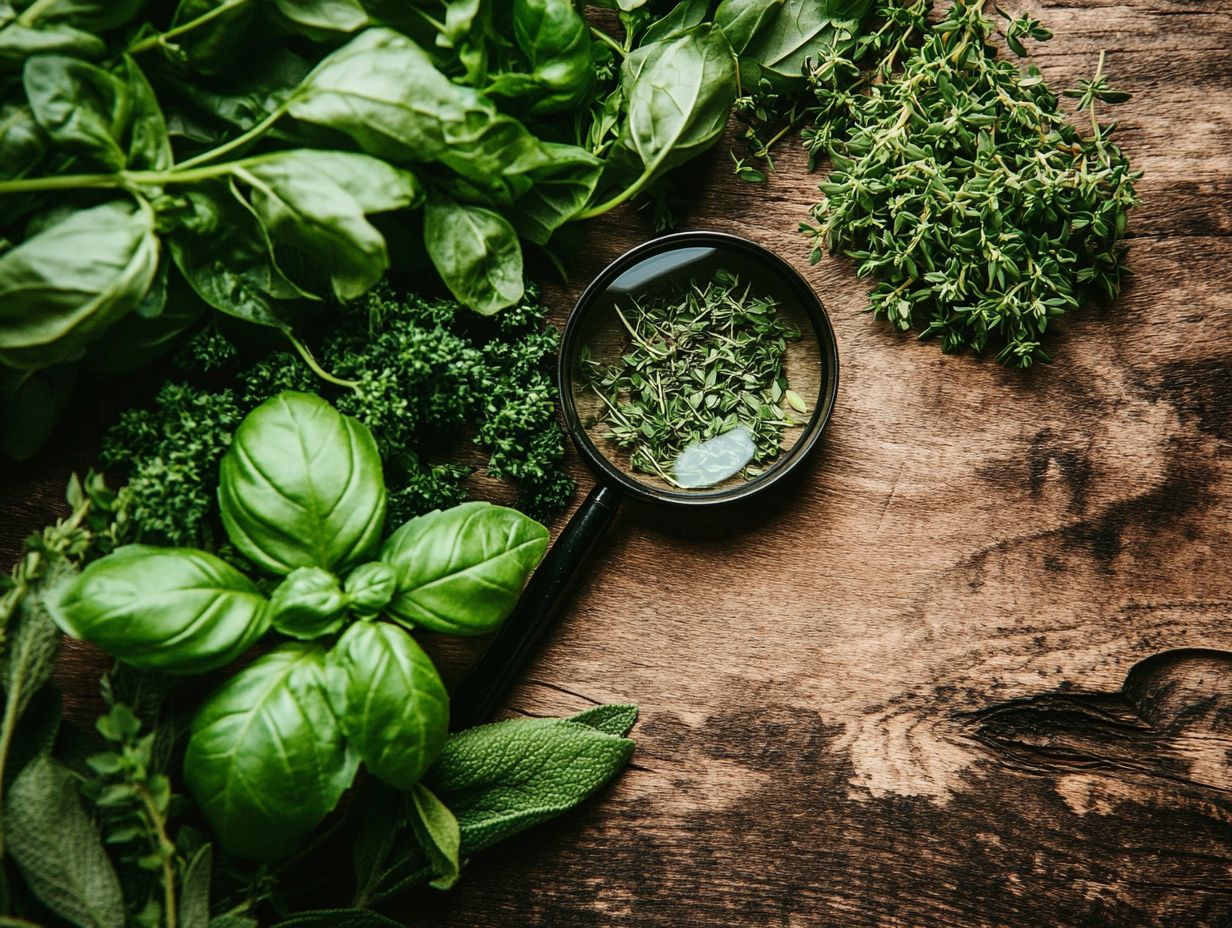
Reliable sources for information on herbal safety include esteemed institutions such as the National Institutes of Health and the Cleveland Clinic. Both provide scientific evidence to help you make informed decisions about herbal supplements.
Consulting a healthcare provider can further enhance your understanding of the risks and benefits associated with specific herbal products. Resources like the American Herbal Products Association offer clear guidelines on the use and composition of various herbs.
Peer-reviewed journals are publications where experts evaluate research before it is published. They frequently publish studies assessing the efficacy and safety of herbal treatments.
Platforms like PubMed grant you access to extensive research articles, allowing for a deeper understanding of herbal safety. Explore the U.S. Food and Drug Administration website for vital regulations and safety alerts regarding herbal supplements.
This way, you can ensure you re equipped with credible information before making any personal health decisions.
Factors to Consider When Assessing Safety
When evaluating the safety of herbal products, a multitude of factors requires your careful attention. Individual health conditions, potential drug interactions, and specific safety concerns linked to the herbal ingredients all play significant roles.
You must weigh these elements carefully to protect your health! What might be perfectly safe for one person could present serious risks for another especially for pregnant women or those with underlying health issues.
Individual Health Factors
Individual health factors are crucial in determining the safety of herbal products. Your unique health conditions and biological responses can vary significantly.
For example, if you’re pregnant, certain herbs may pose additional risks. This highlights the necessity for personalized healthcare advice.
Chronic illnesses like diabetes, heart disease, or liver dysfunction can profoundly affect how herbal remedies interact with your existing medications.
If you have a complex health history or are undergoing specific treatments, it’s essential to tread carefully. Some herbs might worsen your condition or trigger unexpected side effects.
Recognizing these intricate interactions underscores the importance of consulting healthcare professionals before adding herbal supplements to your routine.
This is especially true if you’re balancing the delicate situation of pregnancy or managing chronic health concerns.
Possible Interactions with Medications
When evaluating the safety of herbal products, it s essential to consider potential interactions with medications. Many herbs can adversely affect prescription drugs.
Consulting a healthcare provider is crucial to identify these risks and ensure safe consumption of both herbal supplements and traditional medications.
Take St. John’s Wort, for example. While it s often sought after for mood enhancement, it can actually reduce the effectiveness of antidepressants and birth control pills.
Then there’s garlic, a beloved supplement for cardiovascular health. It can amplify the effects of anticoagulants, which are medications that help prevent blood clots, leading to an increased risk of bleeding.
These examples underscore the significant safety concerns regarding herbal interactions. This highlights the necessity for open communication between you and your healthcare professionals.
By discussing all supplements, including herbal options, you can better manage your health and minimize potential complications from unforeseen interactions.
Commonly Used Herbs and Their Safety Profiles
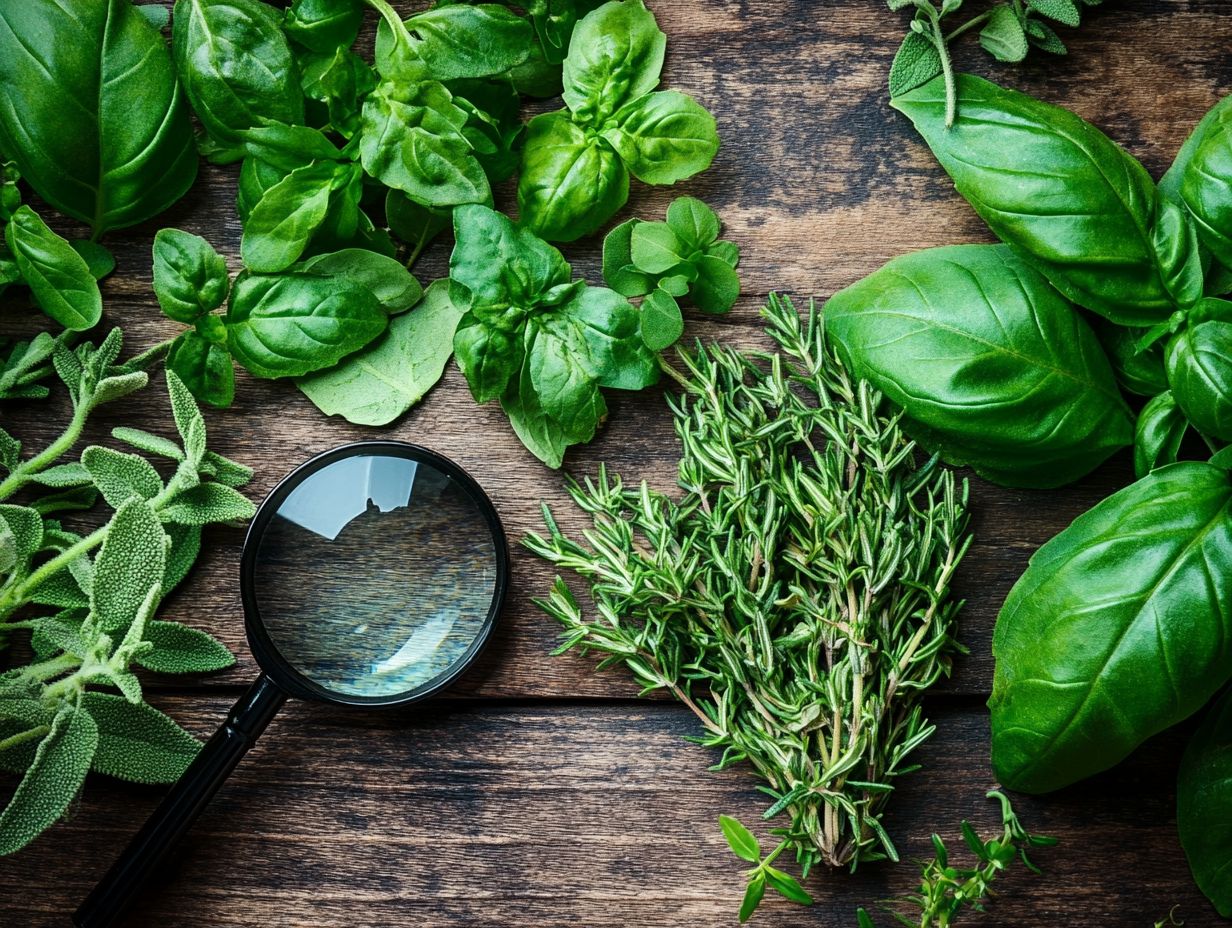
You ll find that many popular herbs, like aloe vera, black cohosh, ginger supplements, and St. John’s wort, each come with their own unique safety profiles that are essential for you to understand.
While certain herbs may present promising health benefits, others might carry potential risks and adverse reactions. This warrants your careful consideration.
It’s important to navigate this landscape with informed awareness.
Overview of Popular Herbs and Their Safety
An overview of popular herbs such as aloe vera, black cohosh, ginger supplements, and St. John’s wort presents a fascinating array of safety profiles and health benefits. While these herbs have long been valued for various health conditions, each comes with its own set of safety considerations and possible side effects.
Understanding the specific safety profiles of these herbal supplements is vital for making informed choices. Take aloe vera, for instance. People use it for its soothing effects on digestion and skin. However, overindulging can lead to gastrointestinal discomfort.
Then there’s black cohosh, often sought after for relief from menopausal symptoms. It’s crucial to be aware that it might pose risks of liver damage for some individuals.
Ginger supplements are hailed for their anti-nausea benefits, yet they can interact with certain medications and may cause heartburn in some users.
Lastly, St. John’s wort is renowned for its antidepressant properties. However, it brings along significant drug interactions that require your attention. Hence, while these herbs can provide various benefits, it s essential to approach them judiciously, keeping both their traditional uses and potential risks in mind.
Practicing Safe Use of Herbs
Practicing safe use of herbs is crucial for anyone eager to integrate herbal products into their health regimen. This involves understanding safe consumption practices and adhering to appropriate dosages.
Make sure to consult a healthcare provider to ensure the purity of the products you choose. This will help mitigate any potential health risks linked to improper use. For parents, understanding herbal safety for kids is crucial. Taking these precautions will help you explore herbal remedies confidently.
Tips for Safe Consumption and Dosage
When it comes to safely consuming and dosing herbal products, sticking to recommended guidelines and consulting with a healthcare provider is essential for minimizing risks. You should always be mindful of the potency of herbal supplements, considering your individual health conditions and potential interactions with medications.
To further safeguard your experience with these natural remedies, choose trusted brands for the best quality. This means carefully examining labels for purity and concentration, as well as researching the brand’s credibility.
Start with lower dosages to assess your tolerance before gradually increasing it. Pay close attention to any adverse effects, including gastrointestinal discomfort or any signs of liver damage. Discussing herbal supplementation with your healthcare provider can offer you personalized insights, ensuring your choices align with your overall health goals while reducing the risks associated with the importance of safety in herbal medicine and how herbs might affect your medications.
Frequently Asked Questions
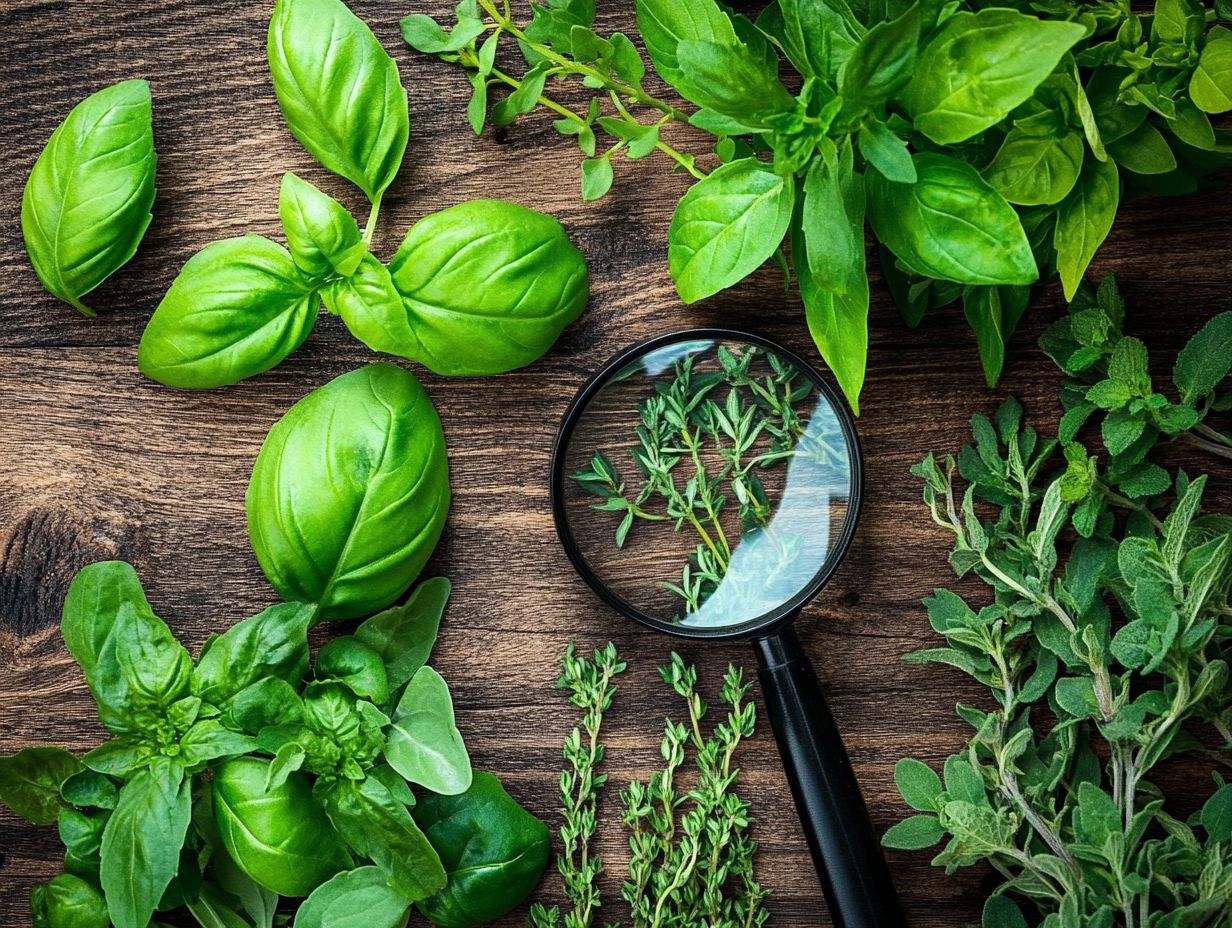
How Do I Know if an Herb is Safe?
There are a few ways to determine if an herb is safe to use, including reviewing scientific evidence and consulting with a healthcare provider for guidance on herbal medicine risks.
What are some potential risks associated with using herbs?
Some herbs may have side effects or interact with medications. Therefore, it is important to research and consult with a healthcare professional before use, particularly concerning herbal medicine and potential adverse effects.
Are there any specific safety guidelines for using herbs?
The safety of herbs varies based on dosage, duration, and individual health conditions. Always follow the recommended dosages and consult a healthcare professional.
How can I ensure the quality and safety of the herbs I am using?
Choose herbal ingredients from reputable sources. Look for labels from trusted organizations like the National Institutes of Health or FDA that confirm purity and safety.
Are there any warning signs that an herb may not be safe for me?
If you notice allergic reactions or stomach problems, stop using the herb immediately. Be sure to consult a healthcare professional.
Can certain groups of people safely use herbs?
Some herbs may be safe for adults but not for children. Pregnant women and individuals with specific health conditions should always consult a healthcare provider before using herbs.


